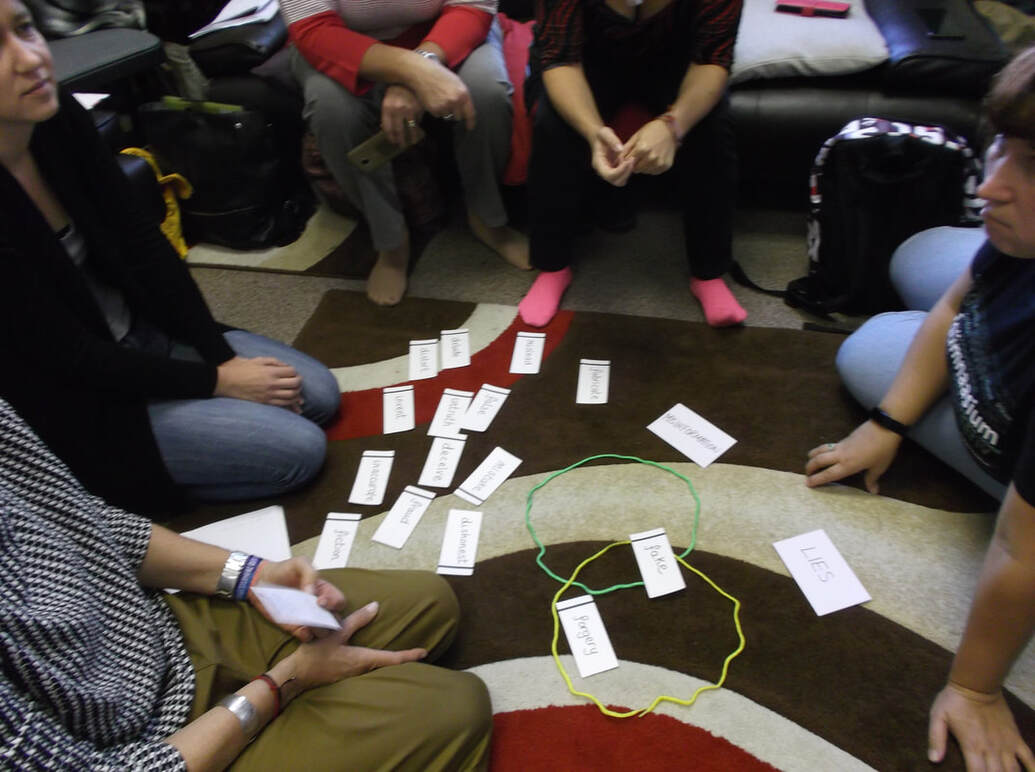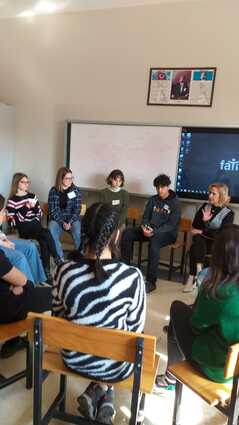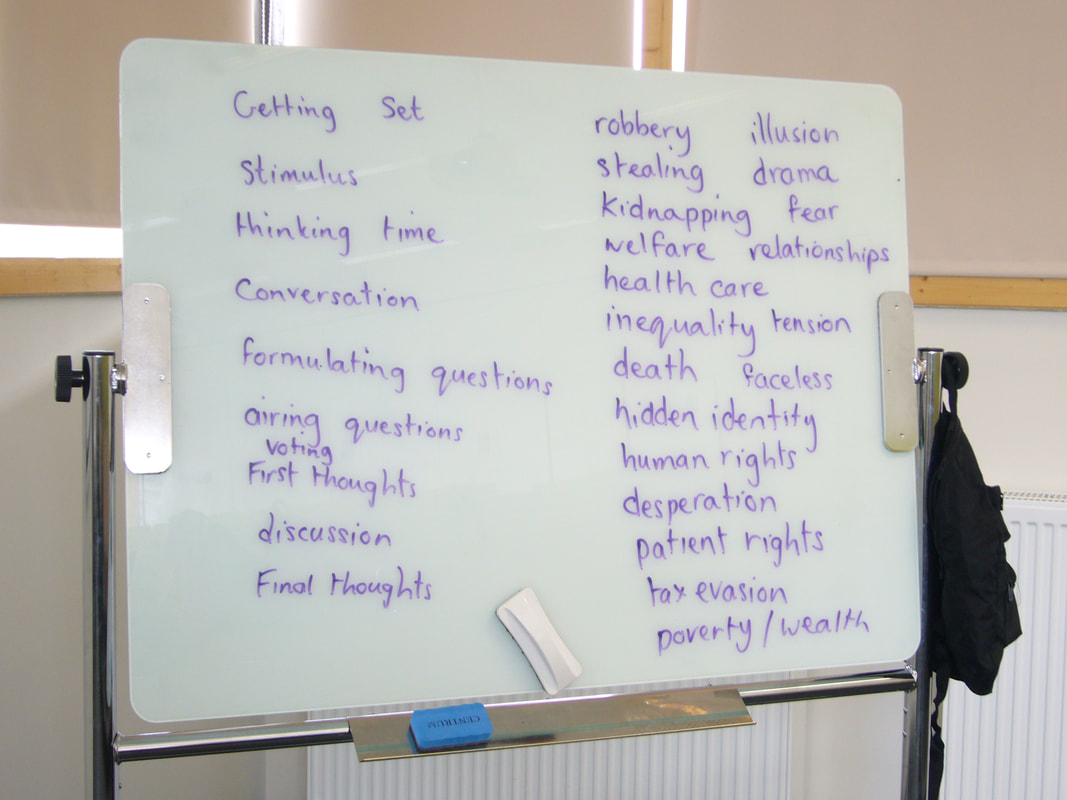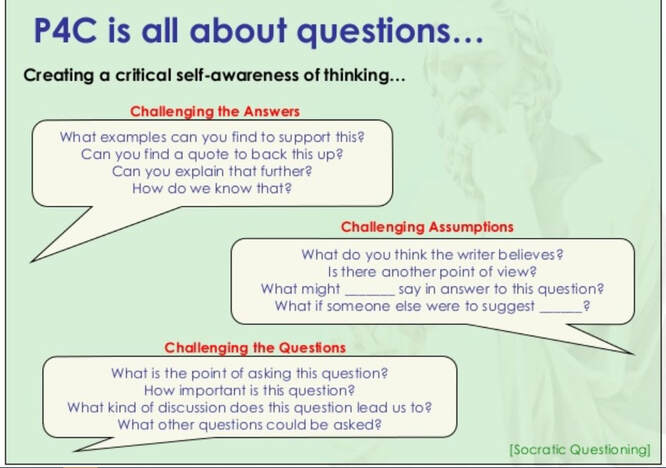Dialogue and Enquiry
Creating an environment for dialogue and enquiry was crucial in all aspects of project delivery. How could we learn to listen carefully, shape and express our own thoughts, disagree respectfully and respond creatively and collaboratively?
Creating an environment for dialogue and enquiry was crucial in all aspects of project delivery. How could we learn to listen carefully, shape and express our own thoughts, disagree respectfully and respond creatively and collaboratively?
|
Building “Communities of Enquiry”, where we could be exposed to different perspectives and be supported to reflect on our own assumptions, was a key priority. We chose to adopt a Philosophy for Children/Communities (P4C) approach, as it provided a framework that could be adapted to different context, providing opportunity for students to direct discussion and develop their own facilitation skills. |
|
Prompting people to ‘think otherwise’ can be helped along by generating and responding to questions that are ‘philosophical’ and open-ended. Generating discussion is a really good way of encouraging deeper learning, causing people to stop and really listen to the talk that is taking place. It gives people the chance to see where they can learn from, refine their own views and outlooks and gain new knowledge and perspectives. P4C enquiry is a democratic process, where those taking part create their own questions that are prompted/provoked by some sort of stimulus. They go on to vote on the question they want to discuss and get involved in the enquiry/ensuing discussion. The facilitator does not attempt to direct the enquiry or discussion by choosing the topic or the question. A P4C enquiry is not the same as a debate or circle time discussion, but these can help build up to a P4C enquiry. |
P4C - Philosophy for Children (and adults too!) - is useful for all sorts of classroom situations, whether within a subject, during circle time or in tutor-time. You can use the full P4C 8- or 10-step approach – I like this diagram (see below), produced by Humans not Robots, discovered on a Slideshare site - from generating questions in response to a stimulus, through to selection of a question for discussion and the ensuing discussion, culminating in final thoughts.
|
The P4C process for reading…
|
... or you could ‘dip in’ at any of the stages to use what best fits the learning you want to take place. Although this won’t be a true P4C enquiry, this will still have a place in teaching and learning and does allow practice within a ‘safe space’ or community of enquiry.
At its best, P4C enquiry can become second nature to bringing excellence to learning; encouraging a curious and enquiring mind, a questioning approach that takes nothing for granted and a willingness to listen to multiple perspectives. It can be embedded and underpin teaching and lifelong-learning.
Even at young ages, I have found children will talk, listen, reflect and respond. Facilitating cross-phase/multi-aged P4C activity can be rewarding too, as different interpretations, viewpoints and passions enliven the enquiry.
Skill development in listening deeply and talking confidently – in adults, as well as children – does need practice. So dipping into the P4C process can help ensure, slow but sure, familiarisation with P4C, and the building of a safe and secure space, where listening without talking is fine. Exposure to different talk and viewpoints can be really helpful without the need to contribute verbally.
I’ve found that I’ve built up a collection of tried and trusted stimulus that I can make use of in a wide range of situations, and these might just prompt you to do the same. Having well-thumbed book, a much-watched short film, a quote, a powerful photograph and some ‘model’ questions all inspires confidence in the facilitator and in when and how you can bring in P4C enquiry, and when to encourage a community of enquiry.
Here are a few of my favourite stimulus - what direction will your participants take the enquiry?
Even at young ages, I have found children will talk, listen, reflect and respond. Facilitating cross-phase/multi-aged P4C activity can be rewarding too, as different interpretations, viewpoints and passions enliven the enquiry.
Skill development in listening deeply and talking confidently – in adults, as well as children – does need practice. So dipping into the P4C process can help ensure, slow but sure, familiarisation with P4C, and the building of a safe and secure space, where listening without talking is fine. Exposure to different talk and viewpoints can be really helpful without the need to contribute verbally.
I’ve found that I’ve built up a collection of tried and trusted stimulus that I can make use of in a wide range of situations, and these might just prompt you to do the same. Having well-thumbed book, a much-watched short film, a quote, a powerful photograph and some ‘model’ questions all inspires confidence in the facilitator and in when and how you can bring in P4C enquiry, and when to encourage a community of enquiry.
Here are a few of my favourite stimulus - what direction will your participants take the enquiry?
My Top 10 stimulus |
Title |
Possible themes |
Web link/source |
Short film (6 mins) |
Piper; a sandpiper bird chick finds out about the sea |
Being brave Another view Identity |
|
Short film (3 mins) |
Would you stop if you saw this girl on the street? UNICEF |
Child rights Perspectives Identity |
|
Book, quotes & animation (30 mins) |
The Lorax by Dr Seuss A story about the environment and the Lorax, who "speaks for the trees" and confronts the Once-ler, who damages the natural environment whilst being an entrepreneur |
Interdependence Environment Choices Activism/ taking action What matters to you |
|
Objects/realia |
Bangladesh Everyday items from around the world – see short clip for examples |
Everyday living What matters to me Culture and lifestyle |
|
Model question |
“Is it possible to live a good life without costing the earth?” |
Sustainable living Interdependence & Globalisation |
- |
Model question |
“If you could change one thing about the world, what would you choose?” |
- |
- |
Model question |
“Which is more important, doing the right thing or doing things right? |
- |
- |
Ice-breaker |
“Which of the 7 dwarves are you most like?” |
- |
- |
Ice-breaker/model question |
“Which modern convenience would you like to un-invent?” |
- |
- |
Ice-breaker/model question |
“If there was one thing in your past (history) that you could go back and change, what would it be?” |
- |
- |
There are lots of models, theories and courses you can undertake to build your expertise and further your interests. Why not browse those listed below to find something of interest to you?
Further reading:
1. Relevant recent research
|
Global Learning Programme Innovation Fund
Research Series Paper 6 How can the Philosopher’s Backpack enrich critical global thinking? Jane Yates 2018 - Crown Copyright |
Global Learning Programme Innovation Fund
Research Series Paper 5 Participatory Pedagogy in Practice: Using effective participatory pedagogy in classroom practice to enhance pupil voice and educational engagement Jen Simpson 2018 - Crown Copyright |
2. Articles, blogs and comment
|
The importance of P4C in education
from 18 June 2018, Think Global Blog (accessed 9/4/2021) |
Philosophy for Global Learning: Tried and Tested Stimuli
Cumbria DEC |
P4C/Thinking Questions for discussion
TES free download |
3. Selection of older research collated by Sapere all available for download at:
https://www.sapere.org.uk/about-us/p4c-research.aspx, including:
https://www.sapere.org.uk/about-us/p4c-research.aspx, including:
- SAPERE P4C improves non-cognitive skills: Nuffield Foundation research
- Better Thinking for Better Learning Project, funded by SHINE
- Large scale study in which children experienced one P4C session a week, University of Dundee research with schools in Clackmannanshire 2001
- RAIS (Raising Aspirations in Society) Project 2003-2006








